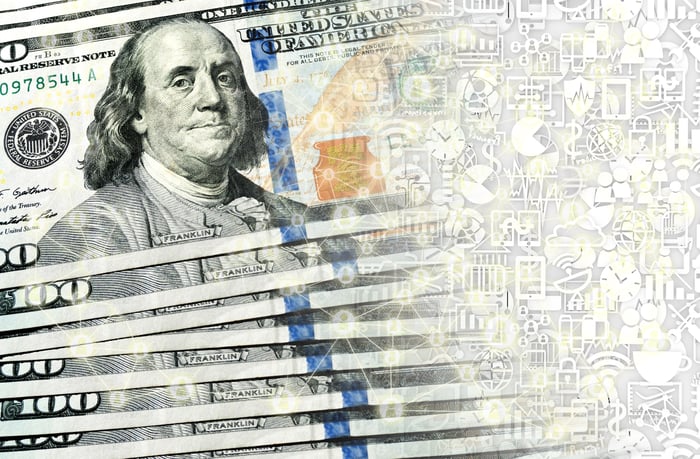In 2017, cryptocurrencies delivered what may go down as the single greatest year for any asset class in history. In just 12 months, the combined value of all virtual currencies rose from $17.7 billion to finish the year at $613 billion. That's a gain of better than 3,300%, and it's a return that traditional equity investors might have to wait decades to achieve.
While there were numerous catalysts behind the ascent in cryptocurrencies last year, none stood out as being more responsible for the rally than the emergence of blockchain technology.

Image source: Getty Images.
Here's how blockchain could revolutionize global business
Think of blockchain as the foundation that underlies each virtual token. As I succinctly put it back in April, blockchain is "a brand-new way of transmitting money without the need for traditional banking networks, as well as a means to store data in a transparent and unalterable way."
Though it's a relatively simple sentence, there's a lot going on with this description. In particular, blockchain offers the means to more quickly and securely move money from one party to another. With today's traditional banking networks, validating and settling transactions can take up to five business days, slowing down the flow of cash. With blockchain, transactions can be processed nearly in real time, even across borders. Even with a lot of variation in proprietary blockchain networks, a common theme is much faster processing times than traditional banking networks, and, as a result of subverting banking networks, the prospect of lower transaction fees.
For instance, Dow stalwart IBM (IBM 1.51%) has been testing its proprietary blockchain network with the assistance of Stellar's Lumens coins in the South Pacific. IBM has partnered with 12 large banks in the region to test the capabilities of transferring money across borders in a quick and secure manner.
There's also a lot going on beyond traditional banking networks. Blockchain has potentially more than a dozen other uses, such as in monitoring supply chains, aiding in the transfer or home or auto titles, tracking prescription drugs to keep counterfeit drugs from entering the supply chain, and ensuring food safety, to name a few benefits.
IBM has been working on solutions in the non-banking space, too. It formed a joint venture with shipping giant A.P. Moller Maersk (better known simply as Maersk) in January to develop blockchain solutions for the shipping industry that'll improve supply chain tracking capabilities and more efficiently move goods.
It's for these reasons that some pundits believe blockchain is the greatest thing since sliced bread, and that it'll change the way businesses and financial institutions operate.

Image source: Getty Images.
Not so fast!
While I'm not arguing against the possibility of this happening at some point in the future, I don't believe there's any chance for blockchain to move the needle for corporate America anytime soon -- and I have a laundry list of reasons to back up this thesis.
Topping the list is what I like to refer to as the "proof-of-concept conundrum." In defined demos and small-scale projects, blockchain has worked marvelously. However, no businesses have been willing to take its proverbial training wheels off and unleash this technology in the real world. The reason? No enterprise will commit fully until blockchain demonstrates that it can scale without its processing speeds and security degrading. Yet, no businesses are willing to give the technology a real-world opportunity to prove its ability to scale. This Catch-22 could cripple the ability of blockchain to move beyond proof-of-concept tests for years.
Another issue is that blockchain isn't necessarily a game changer for all industries and sectors. Yes, it could have an immediate impact for financial institutions and provide real-time tracking and transparency for logistics providers. But a number of other sectors and industries have no immediate need for a technology that acts as an immutable log of data, suggesting that blockchains reach is more limited than most people realize.
Next, there's the cost to implement blockchain. In some instances, blockchain can't just be used to support or overlay existing infrastructure. Some industries will need to completely remove existing infrastructure and start anew with customizable blockchain. Doing so would be an exceptionally costly and time-consuming process, which is yet another reason why the scope of industries and sectors that could be helped by blockchain is probably a lot smaller than is being advertised.

Image source: Getty Images.
We also can't overlook the fact that blockchain hasn't been impervious to hackers. According to a recently released analysis from Carbon Black, $1.1 billion worth of cryptocurrency has been stolen by hackers through the first five-plus months of 2018. Worse yet, 44% of these stolen funds were Monero tokens (known as XMR). Monero is a privacy coin, which means that it purposefully uses its network to obfuscate the sender and receiver of funds, as well as the amount of money being sent. This makes tracking down stolen Monero tokens practically impossible for the Securities and Exchange Commission.
Add these concerns up, and I believe a strong case can be made that investors have, once again, overestimated how quickly a new technology will become mainstream. While I wouldn't take blockchain off your radar, as there are some very exciting small-scale tests being conducted, I would suggest tempering your expectations with regard to the monetary impact blockchain will have over at least the next three to five years.




